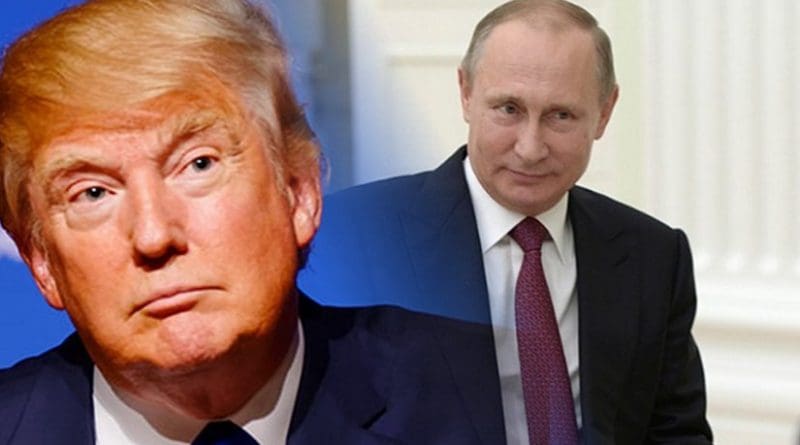Vanishing Hopes Of Russia-US Détente – OpEd
By Arab News
By Maria Dubovikova*
Russians love conspiracy theories and it is difficult to believe that anyone could beat them at it. They see conspiracy everywhere. Americans, on the other hand, aspire to be the first in everything, so much so that they are actually dethroning the Russians, becoming the first conspiracy theorists in the world in their pursuit of anyone who has had hypothetical contacts with Russia.
Believing that Trump was elected president thanks to Russia is dangerous for the US and counterproductive for world stability. His election can, however, be explained without having to resort to nonsensical conspiracy theories.
The political establishment, the elites, the “intelligentsia” and the upper middle class have become increasingly more detached from the rest of society. Moreover, they are not the great majority and have lost authority and influence on certain segments of society, following economic shocks and disillusionments.
While communicating with Americans, one often hears the statement: “I don’t know anyone who could vote for Trump! I don’t know who elected him.” It is the same attitude displayed in the UK by the Britons who claim to have no clue who voted for Brexit; in France, by those who wonder who would vote for Marine Le Pen; and in the Netherlands, where some Dutch have no idea who are the 55 percent who might vote for the right-wing leader and for exit from the EU.
It is the same attitude, and situation, in all the countries where far-right populism is building momentum following the destructive impact of certain socio-economic factors.
Trump’s election was a purely American affair, the result of the disastrous policies of Barack Obama. Russia’s role in Trump’s election was nil. The only thing the US can accuse Russia of is that it is happy that Trump assumed power. But unconcealed and undeniable rejoicing expressed by a big part of the Russian public over Trump’s election is justified by the extreme fatigue previous confrontations and tensions had brought about.
Trump gave hope, which now seems to have been in vain, that a change in US-Russian relations could come about and that, at least, a dialogue of equals would take place.
Spreading panic among Americans is absurd. And that is what happens when one sees the stir about the Russian ambassador to the US, Sergey Kislyak, who is accused of meeting and having talks with US officials and being a Kremlin spy.
All those who have any contacts with Russian political or business circles are under fire, accused of being Kremlin agents.
What if Russia did the same? The US ambassador to Russia was ambassador to Ukraine shortly before the so-called Euromaidan, the upheaval that resulted in the coup d’état in Ukraine.
Russian fans of conspiracy theories believe that John F. Tefft was behind those dramatic events that have seriously damaged Russia’s interests. Russia’s conspiracy theorists accused him of paving the ground for the revolt that was allegedly sponsored by the State Department.
Tefft is a frequent visitor to leading Russia’s think-tanks and research centers, participates in expert meetings and high-level discussions and conferences, as well as with representatives of the US Embassy staff.
Visits to the Ministry of Foreign Affairs and other state institutions are part of his daily routine as with any ambassador. He welcomes Russian experts to the embassy as well as representatives of political circles and opposition. He is very supportive of Russian opposition. Yet, there is no hysteria over all of this in the Russian media or political circles since most of these activities are part of the daily duties of any ambassador working in any country.
An ambassador’s duty is to communicate, look for opportunities for cooperation, get information to deliver to his home country, etc. The same applies to the circle of experts on both sides who are communicating and cooperating in order to take their countries away from confrontation through building cooperation and allowing a free exchange of ideas. There are several regular formats and individuals actively working on the US-Russia track. It was always like this, even in times of heightened political confrontation.
The hysteria over Russia’s ambassador to the US and high-level Americans having contacts with Russian counterparts brought the possibility of ameliorating the Russia-US ties to an absolute impasse.
Political entities actually risk their careers for meeting or being in contact with Russian officials and risk being investigated for concealing the meetings.
“How much Putin in Trump?” is literally the main concern of the media and political establishment.
Trump has to use metaphors and speak obliquely on any subject in any way related to Russia.
Any attempt by the Trump administration to decrease tension with Russia will most likely be taken by the media and opposing political circles as political treason and form the basis for impeachment; if that happens, the country will plunge into a deeper political crisis and the world will be pushed to extreme uncertainty.
The possible coverage and the impact of a hypothetical meeting between Putin and Trump, which will have to take place sometime in the future, produces shivers in the present environment.
In such circumstances, all hopes to ease tension between the two powers are vanishing. Continuing the confrontation serves neither the interests of the two powers nor of the world at large. The international community is facing enormous challenges; in order to face them, it should stay united.
The Middle East needs Moscow’s and Washington’s cooperation to successfully fight terrorism and to address the rising conflicts among regional powers and forces. A confrontation between the global powers only plays into the hands of destructive forces and pushes the world closer to a fatal collapse. The unjustified paranoia in the US will thus cost the world dearly.
*Maria Dubovikova is a prominent political commentator, researcher and expert on Middle East affairs. She is president of the Moscow-based International Middle Eastern Studies Club (IMESClub). She can be reached on Twitter: @politblogme.

